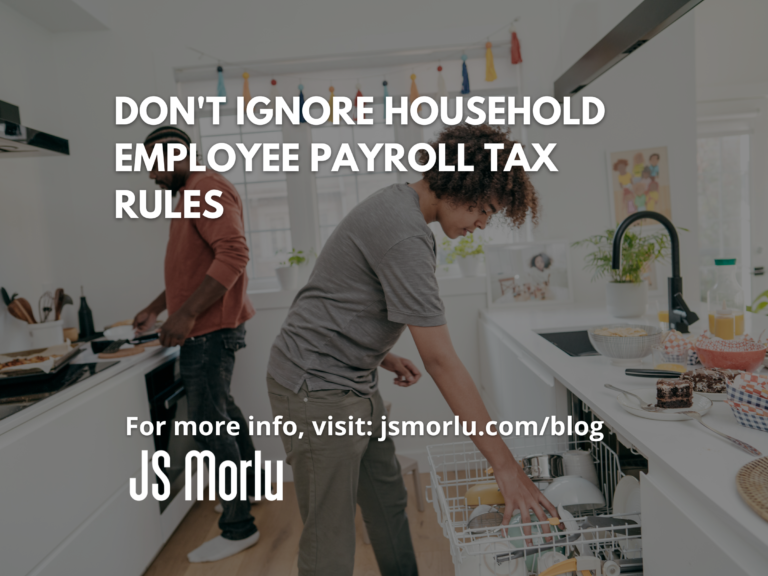Many families rely on domestic employees to keep their households running smoothly. These helpers provide invaluable services, from childcare and housekeeping to elder care and yard work. But what happens when it comes to taxes? There can be confusion for homeowners regarding their obligations as employers. This article will explore the legalities of employing domestic workers and ensure you comply with tax regulations.
The Allure of Cash Payments (and Why It’s a Risky Choice)
We understand the appeal of bypassing paperwork and taxes by simply paying your domestic worker in cash. It might seem like a win-win for both parties. However, this approach poses significant risks. The IRS and state employment departments have the authority to audit employers who fail to properly classify and pay their domestic workers. The consequences can be severe, including back taxes, penalties, and interest.
Furthermore, if your domestic worker is injured on the job or if there’s a less than amicable separation, they may report you to the authorities. This can lead to unemployment claims and additional tax liabilities.

Identifying Employees vs Independent Contractors
The key to navigating domestic worker taxes lies in proper classification. Not everyone who works in your home is considered an employee. Licensed contractors, like plumbers or electricians, are typically independent contractors and not subject to payroll taxes.
The IRS, however, considers nannies, housekeepers, senior caregivers, and many gardeners as household employees. The number of hours worked or the amount paid doesn’t change this classification. Even a written contract doesn’t alter employee status.
Don’t Be Fooled by What Others Do
You might be thinking, “Everyone I know pays cash!” While that may be the case, it doesn’t make it legal. In the event of a worker’s injury, unemployment claim, or disgruntled departure, you could face serious repercussions.
Streamlining Compliance: Partnering with a Payroll Company
The simplest way to ensure you’re following tax regulations is to utilize a payroll service. These companies handle the complexities of payroll processing, tax withholding, and required filings, giving you peace of mind.

The DIY Approach: A Guide to Domestic Worker Payroll
For those who prefer to manage payroll themselves, here’s a breakdown of the essential steps:
- Obtain a Federal Employer Identification Number (FEIN): This unique identifier replaces your Social Security Number for tax reporting purposes. If you already have an FEIN for a sole proprietorship business, you can use the same one.
- Secure a State ID Number: This number is necessary for unemployment insurance and state tax withholding.
- Payroll Tax Withholding: If your worker earns more than $2,600 annually (as of 2023), you’ll need to withhold Social Security and Medicare taxes. Withholding income tax is optional, but only if the employee requests it and you agree.
- State Employment Tax Returns: File and pay state employment taxes as required by your state, which could be quarterly or even monthly in some cases.
- Year-End Filings: Prepare a W-2 form for your employee and a W-3 transmittal form. The deadline for filing these with the Social Security Administration is typically by the end of January.
- Federal Tax Obligations: Schedule H of your federal tax return is where you report household employee payroll taxes. This includes withheld employee taxes, your matching share of Social Security and Medicare taxes, and federal unemployment tax (which is your sole responsibility). There’s a limited exception for sole proprietors who can include household employee payroll taxes with business employee taxes, but such taxes cannot be deducted as a business expense. Generally, maintaining separate personal and business reporting is advisable.
Additional Considerations
- Overtime: The Fair Labor Standards Act designates domestic workers as nonexempt employees entitled to overtime pay after exceeding 40 hours worked in a week. Live-in employees may be subject to different rules depending on your state.
- Hourly vs. Salary: Nonexempt employees cannot be classified as salaried. Their pay must reflect the hours they work.
- Separate Payroll: Household worker payments are considered personal expenses and cannot be deducted as business costs. Therefore, you need to maintain a separate payroll for domestic workers, funded from your personal accounts.
- Work Eligibility: Verifying an employee’s legal right to work in the U.S. is crucial. Both you and the employee must complete Form I-9 (Employment Eligibility Verification) if you’re hiring a regular domestic worker.
- Beyond the Basics: This article provides a general overview. For specific situations, like employing workers through agencies, handling gross wages when paying an employee’s share of taxes, or dealing with non-cash wages, it’s recommended to consult with a tax professional who can offer tailored guidance based on your unique circumstances and state regulations.
For any questions you may have regarding domestic worker taxes and reporting, or for assistance with navigating the complexities of specific situations, don’t hesitate to contact us. We’re happy to help ensure you remain compliant and avoid any unwanted surprises come tax time.
JS Morlu LLC is a top-tier accounting firm based in Woodbridge, Virginia, with a team of highly experienced and qualified CPAs and business advisors. We are dedicated to providing comprehensive accounting, tax, and business advisory services to clients throughout the Washington, D.C. Metro Area and the surrounding regions. With over a decade of experience, we have cultivated a deep understanding of our clients’ needs and aspirations. We recognize that our clients seek more than just value-added accounting services; they seek a trusted partner who can guide them towards achieving their business goals and personal financial well-being.
Talk to us || What our clients says about us


